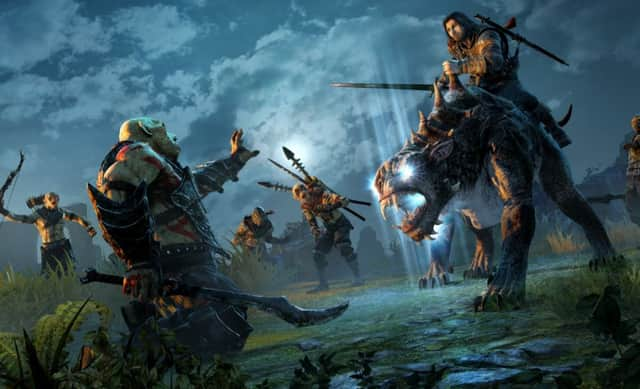The Scotsman Games review: Middle-earth - Shadow of Mordor


Middle-earth - Shadow of Mordor
Platform: Playstation 4 (reviewed) / Xbox One / Playstation 3 / Xbox 360 / PC
Score: 9/10
THERE are no doubt other Lord of the Rings games that have benefited from better titles than Mordor, but few have been able to capture the essence of the series with such gusto and ambition. Turbine’s vast online offering came closest, while EA’s better titles fused the Tolkien universe to solid Devil May Cry-style combat. Mordor, however, combines evocative strands of the epic narratives with its own masterfully designed open world adventure, giving the player a sense that they are just as integral a part of the world as Aragorn.
Advertisement
Hide AdAdvertisement
Hide AdMordor is one of the surprise hits of the late rush of games in 2014. Some might even come to regard it as their game of the year; it would not be an outlandish notion, testament to the way it appropriates winning mechanics from other titles while remaining distinctive and entertaining. Some have described it as a Lord of the Rings themed Assassin’s Creed, a comparison that is not far off the mark. It borrows the stealth aspects of Ubisoft’s series along with the rhythmic combat of the Batman Arkham games, but imprints its own imitable ID on the result.
The narrative plays fast and loose with Tolkien but makes for an involving pretext
Set between The Hobbit and The Lord of the Rings, the game puts the player at the heart of a grand, sweeping story. After Sauron and his marauding army claims the life of the protagonist - Talion, a ranger responsible for keeping Mordor’s Black Gate safe - and those of his family, a fortuitous reincarnation puts him on a quest for revenge. At times, the narrative may perplex long-time fans of the series, given the way it plays fast and loose with the source material, but overall it makes for an involving pretext.
Yet the masterstroke of Mordor is not its story or its depiction of Tolkien’s world, but what remains unseen. The game’s clever AI design, dubbed the Nemesis System, will doubtless influence numerous titles to come, and with good reason. To watch someone playing the game and slaying orcs indiscriminately, it may not be immediately obvious that there will be repercussions. But every death in the game impacts on the hierarchy of Sauron’s hordes. Some are worth sparing for the intel they might provide to help defeat hardier foes, while others who inflict yet another death on Talion are promoted in the ranks.
Unusually for a game, every death has a consequence in Mordor
Whereas the vast majority of games treat death - both those of NPCs and the player - as a fleeting experience quickly remedied by a hit of the restart button, Mordor makes clear there are consequences, with every action bringing about a reaction. As you play on, encounters with enemies take on significance and purpose and each playthrough heralds its own little micro narratives. As with all the best innovations in gaming, it is not until someone coins the idea that you wonder why it has taken them so long.
TIPS AND TRICKS:
1) Mind control abilities do not become available until seven or eight hours into the game, but once they are, be sure to make extensive use of them. They are a crucial way of winning battles.
2) Use intel as often as possible. Enemies that seem invincible can be defeated if you know how and where to strike them.
3) Kill the bodyguards of more important foes before you tackle them. It makes the job considerable easier.